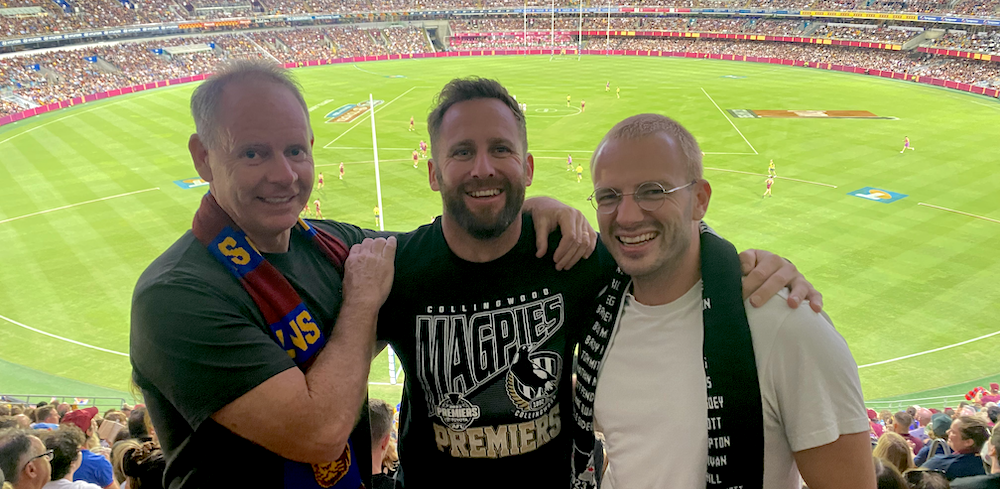
GLBTI aged care finally gets noticed
The inclusion of GLBTI seniors in the Productivity Commission’s draft report — Caring for Older Australians — has been welcomed by Australia’s peak GLBTI health body.
National LGBTI Health Alliance chair Paul Martin said specific reference to the unique needs of GLBTI seniors is a step forward.
“We are pleased to see the inclusion of LGBTI older people so significantly in this report,” Martin said. “For too long the needs of our community elders have been ignored.”
The draft report, released this month, groups culturally and linguistically diverse and GLBTI seniors as groups requiring “flexible and appropriate” aged-care services.
The report said submissions showed GLBTI seniors want greater recognition of their sexuality and gender identity and more culturally appropriate services, including having safe and inclusive environments, recognition of partners when it comes to decision-making and greater sensitivity of staff.
Martin said the Alliance is keen to get the ball rolling.
“The Alliance stands ready to work with government, our members and the aged-care sector to improve services for LGBTI seniors and provide quality care and support for those in need,” he said.
Adelaide gerontologist Dr Jo Harrison told the Star Observer the number of submissions relating to GLBTI aged care was “encouraging.”
“It is a very significant development to have GLBTI issues so definitely represented in such a significant document that will influence federal policy,” she said.
“I think this opens the door to further communication with the Productivity Commission about proposals and recommendations that could be made which would strongly put the case for concrete action and policy developments to address GLBTI aged care needs.”
Harrison said firm recommendations from the report need to be developed along with a commitment from the Gillard Government to develop a GLBTI National Aged Care Plan.
In a submission to the draft report, the Western Australian-based GLBTI Retirement Association Inc (GRAI) said GLBTI seniors are often “invisible”.
“To date, clients’ sexual orientation or gender identity remains largely invisible to service providers: an invisibility that impacts negatively on these clients’ wellbeing, and is extremely relevant to the standard of care made available to this cohort.”
Last year GRAI and WA’s Curtin University released a groundbreaking report into the state of GLBTI aging.
Researchers surveyed around 80 aged-care facilities and found around 90 percent of respondents said they hadn’t had any experience of GLBTI residents or families, either past or present.
It is understood there were GLBTI people accessing services in the facilities surveyed.
The research also found aged-care facilities had a lack of understanding of recent changes to federal legislation which improved the rights of same-sex couples.
The Commission is currently calling on feedback from the draft report and public hearings will be held in March and April. Written submissions can also be made.
The final report is scheduled to be released in June this year.










I have had very recent experience in working in a nursing home (for over 18 months) and sadly I report that homophobia is alive well. While there may be anti-discrimination policies etc in place Mel there are plenty of covert ways to carry out discrimination and if the dominant culture of the organisation tends to be homophobic…. If staff were nervous of their GLBTI status becoming known …what chance did residents have being open about their sexuality and not experiencing fallout. I also found that staff who were compassionate, caring and non-discriminatory in their work tended to leave the facility in frustration over basic care concerns let alone discrimination issues. Sadly there are many areas of concern in our aged care facilities with regard to the treatment of our older citizens – GLBTI discrimination is but one important area of concern.
It seems that the ALSO Foundation has abdicated from this field, and are now more interested in being a broad-based GLBTI lobbying organisation instead of doing the hard yards they have never done to establish GBLTI health care. Whereas the Matrix Guild have partnered with a mainstream womens organisation to purchase, using ONE legacy, their first apartments for senor lesbians, the Foundation is trying to alter the terms of bequests it has received over the years so that they can be diverted to non age related projects.
After having my Mum in 3 homes, not once has the question come up of her sexual orientation… They never saw her, just admitted her. I am a massive supporter of equality, and my simple mind doesn’t get how it would make a difference.
Questions on forms do not all have to be completed and I don’t recall any being asked of her sexual orientation. I have seen alot in these homes, things I would like to forget, as I spend alot of time with my Mum. Some of the residents are the weirdest bunch of people that one can see, their weirdness coming from problems in their minds. I have not noticed any issues arise because of their ‘differences’, nor staff being biased.
The actually running of homes, and some staff are the problem, but that’s because of the people they are.
I have found a large number of staff working in Aged Care are gay, and they have been more caring than most straight staff.
I love the idea of a Minister of Equality, as a voice needs to be there. Maybe that is something that all the support groups should actually be aiming for.
This is an under rated and urgent matter!
Mel
I disagree with you on a number of levels also, and I am not sure why the fear exists about protecting the rights of older GLBTI people in Nursing homes. If you’re not homophobic, and people in your care are treated well, then there would be no need to worry about an accreditation and funding legislation that takes the rights of GLBTI people into account.
As far as the Nurses not being able to be homophobic due to their code of ethics, well the reality is some Nurses and even Doctors can be very homophobic and thrive in their career. Even Nursing Directors can be homophobic. Take for instance this link about a practicing Nurse calling on all homosexuals to be removed from the face of the Earth. I would not want anyone in his care. http://www.cathnews.com/article.aspx?aeid=15176 But there it is. Or there is that Nursing Director and the Latex Gloves…. No the code of ethics is an ideal not everyone has to live up to.
If someone does not have a power of attorney, then they can be subject to other laws that do discriminate. Hell you cannot even have your partner recognized under the Federal Equal Opportunity Act. You certainly cannot marry.
There is legislation federally that excludes religious businesses, from having to accept GLBTI people into Nursing homes, schools, and hospitals. As I have said presently the current system relies on the good will of people like you to do the right thing. I think with all the anecdotal evidence, things are not working out well.
Now there are many people wanting protection and legislation for people in the GLBTI community, so they can access government funded services, and be treated with dignity and respect. They are health care professionals like yourself, specialist like Dr Jo Harrison, and members of the public who feel there are great problems with the current approach.
If we are the country of a fair go, then our older members of the community are in need of our help and protection. These are people who suffered greatly under previous governments. Some were thrown into jail for making love to their lifelong partner, some had parts of their brain cut and studied, some were sent to psychiatric hospitals, all this and some come to the end of their life neglected and forgotten. Even minute changes on forms can make a difference to people who have spent there whole lives in the closet, such as Significant Other, giving them the proper visiting rights etc as other family members get. We need a system that is standardised.
It is time we had a Minister that can take control of social inclusion, and help make us a more progressive society. It is time we had a Minister for Equality.
From the “Discrimination and older gays: surviving aged care – Equal Time, August 2004”
Dr Harrison tells of one elderly man who had come out to the occupational therapist at a day centre after she asked whether he had a partner and what was their name. This enabled him to express some concerns that would otherwise have remained unaddressed.
However the Director of Nursing subsequently asked him to wear latex gloves while at the centre and threatened to refuse service to him if he did not comply. The occupational therapist managed to resolve the issue but it was a struggle and they had limited support from other staff.
Another elderly man was transferred from a retirement village to a psychiatric hospital because the management disapproved of his “younger male visitors”. There are other cases of nurses refusing to bathe a “suspected lesbian” and elderly people being threatened with outing if they complained about how they were being treated.
Transgender and intersex people are also particularly vulnerable to discrimination in aged care settings, to the point where they may avoid seeking assistance altogether. There is anecdotal evidence of denial of services, forcibly preventing cross-dressing and deliberate physical violence when people are revealed to be transgender.
Transgender people may also have medical issues related their original gender that emerge with ageing, such as osteoporosis or prostate cancer. These may not be addressed because they may be too intimidated to seek medical advice of any kind.
Harrison says that aged care workers must develop a better understanding of diversity around sexuality issues in order to provide quality service to future clients who have not led closeted lives and need non-judgemental care and support. There have not yet been significant advances in this area in Australia.
Education of service providers is very important, and overseas evidence suggests that initiatives based on empowerment, involving gay and lesbian professionals from related organisations and organising speakers bureaux of older educators, have been particularly successful.
Further among some of the findings of the Human Rights and Equal Opportunity Commission Stories of discrimination experienced by the gay,lesbian, bisexual, transgender and intersex community
October 2007
The Inquiry heard about the following difficulties in accessing aged care:
• overt discrimination experienced by GLBTI people accessing aged
care;
• no acknowledgement of a visiting partner;
• no staff training to ensure recognition and respect for GLBTI residents and their relationships;
• the failure of official forms (for registration etc) to recognise GLBTI
relationships; and
• potential discrimination when care is provided at home.
For the record my partner is a doctor and over the years we have seen the suffering caused to older members of the community not being able to access nursing homes. Patients have even resorted to take their own life. Not that this matters to some, but it does to us. It gives us rage against a policy that leads to great suffering. It makes us question the exemptions to exclude people in the Equal Opportunity Act. Some Australians are worth less then others.
Even on this site people from time to time write of the hardship defrocking a friend so they can access a nursing home.
I fully support the findings of the Curtain University as it backs up, many of the reports from patients my partner has seen over the years, who need aged care services.
I do not want a system that relies on the Good Will of some nursing homes. I want a system that fully includes GLBTI people in the accreditation. I think if you are not going to accept people who are in the GLBTI community, then do not accept government money. If you do not have policies in place for the GLBTI community, then I think you should not get taxes. The current accreditation model clearly is broken if people who need care have great difficulty accessing it, and some have to resort to suicide out of frustration.
I vehemently object to this article and Dave’s reply on multiple levels. Not becuase I am homophobic but aside from the citation of the Curtain University study and the short quote from the Gerontologist, I question the understanding that the other stakeholders have of the aged care industry and nursing as a profession.
First of all, Dave, I don’t know what your paticular profession is but I can tell you from EXPERIENCE as a nursing supervisor in this field, that you are evidently misinformed. Many nursing homes may operate under the NAME of religious organisations, however, are staffed with professionals who do not practice wanton discrimination (despite what you may believe). Such discrimination flies in the face of not only legislation (eg: the Aged Care Act of 1997 and the Charter of Residents Rights and Responsibilities) but also our codes of ethics as both nurses and human beings. People of all different walks of life are welcomed as equals and treated with dignity and respect and managed for their illness / disability with professionalism. Whilst the Australian Federal Government does subsidise Aged Care, they must first meet stringent requirements (including compliance with pertinent legislation) and become accredited – so funds are not actually just “given” to the “church” for spending as they please. Residents in these homes also pay a substaitial contribution to their own accomodation costs.
Lets talk medical decision making briefly; a person is able to nominate ANYBODY as their Enduring Power of Attorney and furthermore is able to nominate anyone as their next of kin with whom medical and nursing staff will consult on both medical and general issues. There is NO discrimination here, I can assure you. So I would postulate that new legislation regarding same-sex couples remains largely irrelevant in this matter.
As for the study by Curtin University, I would say that the fact that 90% of respondents stating that they had not had an encounter with a GLBTI resident or family could be viewed as a positive response in that nurses and other aged care workers are seeing everybody they treat as HUMAN BEINGS with unique needs as opposed to labelling them black / white / gay / ethnic etc. Isn’t the whole movement about equality (ie: not being seen as different?!) Whilst it is our job to facilitate healthy sexuality in our clients, it is not up to us to judge whom they choose to have sexual relationships with.
Really, I am all for equality but I think you have gone one step too far with very little actual knowledge to back up your accusations.
or gave it to an organisation that is willing to get something done.
I thought this was what ALSO was set up to do, an G &L aged care facility.
All this time, all that money and still NOTHING.
I think we need a gay ‘royal commission’ about ALSO.
Its time they either did something with all the money they have.
It occurs to me that ALSO was originally founded for the purpose of creating retirement housing for the LGTB community … I would be interested just how much is now resident in their funds allocated for such a purpose …
It is time the Gillard Government made a Minister for Equality.
Our taxes should not be given to religious based nursing homes that advocate the exclusion of members of the public, from aged care services, for no other reason than their sexuality. We need to be part of the accreditation of Nursing homes. Only then will we be able to have access and be treated with dignity and respect. For too long, elderly members of our community have had great difficulty finding aged care services that do not discriminate.
Nursing homes should be about your disability, not your sexuality or skin colour or race. The current situation relies on the good will of some Nursing homes, and that is in short supply.
How about a Fair Go for our older members of the community?